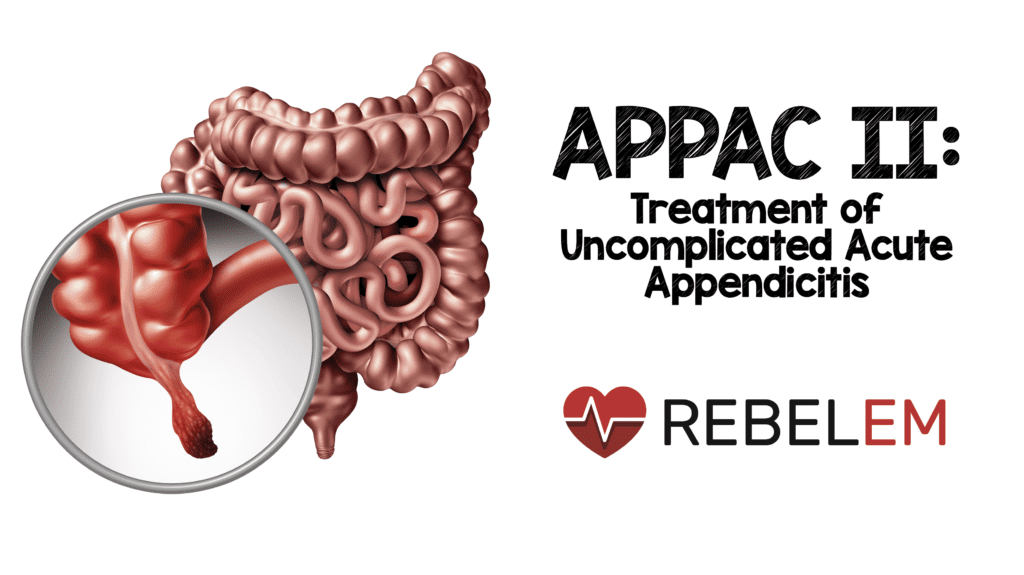
 Background: The recently published CODA trial (Link is HERE) comparing antibiotics vs laparoscopic appendectomy for acute uncomplicated appendicitis demonstrated an antibiotic 1st strategy was non-inferior to laparoscopic appendectomy. However, there were nearly 3 in 10 patient who had undergone appendectomy by 90 days and 2x more complications in the antibiotics 1st strategy. Furthermore, patients with an appendicolith were at much higher risk of complications indicating a surgery 1st strategy for these patients. These results mirror what was seen in the APPAC study. In the original APPAC trial at 5 year follow up 61% of 256 patients with uncomplicated acute appendicitis were successfully treated with antibiotics and those who developed recurrent appendicitis had no adverse outcomes related to delays in appendectomy [2]. One of the big issues with previous studies is the requirement of IV antibiotics before transitioning to oral antibiotics. The ability to initiate oral antibiotic therapy and avoid hospital admission could further decrease cost, improve patient satisfaction, and even improve quality of life.
Background: The recently published CODA trial (Link is HERE) comparing antibiotics vs laparoscopic appendectomy for acute uncomplicated appendicitis demonstrated an antibiotic 1st strategy was non-inferior to laparoscopic appendectomy. However, there were nearly 3 in 10 patient who had undergone appendectomy by 90 days and 2x more complications in the antibiotics 1st strategy. Furthermore, patients with an appendicolith were at much higher risk of complications indicating a surgery 1st strategy for these patients. These results mirror what was seen in the APPAC study. In the original APPAC trial at 5 year follow up 61% of 256 patients with uncomplicated acute appendicitis were successfully treated with antibiotics and those who developed recurrent appendicitis had no adverse outcomes related to delays in appendectomy [2]. One of the big issues with previous studies is the requirement of IV antibiotics before transitioning to oral antibiotics. The ability to initiate oral antibiotic therapy and avoid hospital admission could further decrease cost, improve patient satisfaction, and even improve quality of life.
Paper: Sippola S et al. Effect of Oral Moxifloxacin vs Intravenous Ertapenem Plus Oral Levofloxacin for Treatment of Uncomplicated Acute Appendicitis: The APPAC II Randomized Clinical Trial. JAMA 2021. PMID: 33427870
Clinical Question: In acute uncomplicated appendicitis, is treatment with oral antibiotics alone non-inferior to a combination of IV followed by oral antibiotics?
What They Did:
- The Appendicitis Acuta (APPAC) II trial
- Multicenter, randomized, open label, noninferiority clinical trial
- Performed in 9 Finnish hospitals
- Patients randomized to:
- PO Only: PO Moxifloxacin 400mg qD x7d
- IV + PO: IV Ertapenem 1g qD x2d then PO Levofloxacin 500mg + PO metronidazole 500mg TID x5d
- Patient outcomes assessed daily during hospitalization and after discharge by telephone interviews at 1 week, 2 months, and 1 year
Outcomes:
-
Primary: Treatment success at 1 year
- Treatment Success = Discharge from hospital without surgery and no recurrent appendicitis during 1 year follow up (Predefined margin ≥65%)
- Determine if oral antibiotics alone non-inferior to IV + oral antibiotics with a margin of 6% for difference
-
Secondary:
- Adverse events related to antibiotics or appendectomy
Inclusion:
- Aged 18 to 60 years
- Admitted to the ED
- Clinical suspicion of acute appendicitis
- Uncomplicated acute appendicitis confirmed by CT imaging
- Uncomplicated Acute Appendicitis = Appendiceal diameter >6mm with a thickened, contrast-enhanced wall along with peri-appendiceal edema and/or minor fluid collection and the absence of appendicolith, perforation, abscess, or suspicion of tumor
Exclusion:
- <18 years of age
- >60 years of age
- Pregnancy or lactation
- Allergy to contrast media or iodine
- Allergy or contraindication to antibiotic therapy
- Kidney insufficiency or serum creatinine value exceeding the upper reference limit
- Type 2 diabetes and use of metformin medication
- Severe systemic illness (i.e. malignancy, medical condition requiring immunosuppressant med)
- Inability to cooperate and give informed consent
- Complicated acute appendicitis based on CT findings
Results:
- 583 patients with uncomplicated acute appendicitis
- Treatment Success Rate:
- PO Only: 70.2%
- IV + PO: 73.8%
- Absolute Difference -3.6% (1-sided 95% CI -9.7 to Infinity; P = 0.26)
- The preset noninferiority margin was 6%
- Appendectomy at 1 Year Follow Up:
- PO Only: 29.8% (9.2% during primary hospitalization)
- IV + PO: 26.0% (7.6% during primary hospitalization)
- No statistical difference between treatment groups in LOS, sick leave, or pain scale scores at discharge, 1 week, and 2 months
- No deaths in either group at 1 year follow up
Strengths:
- Multicenter, randomized clinical trial
- Asks a clinically important question
- Randomization appropriately performed
- Groups fairly well balanced in terms of age, pain, inflammatory markers, CT imaging, and duration of symptoms
- 1 year follow up rate for primary outcome was 99.7%
Limitations:
- Moxifloxacin is broad-spectrum and use could result in antibiotic resistance
- Noninferiority margin of 6% was set arbitrarily due to no previous trials available comparing oral and IV antibiotics for uncomplicated acute appendicitis.
- Open-label methodology could have influenced treatment decisions
- Compared antibiotic courses not equivalent in terms of the oral arm (i.e. fluoroquinolone + metronidazole may have increased side effects or may be more efficacious)
- Almost half the patients declined participation or weren’t enrolled (i.e. essentially a convenience sample)
Discussion:
- Non-inferiority trials can be confusing. In this study, non-inferiority was not achieved because the lower limit of the CI was -9.7% which is larger than the preset threshold to establish non-inferiority (-6%). This does not mean that PO only was inferior. However, if there is no difference in hospital length of stay. The PO only strategy would only be useful if it resulted in a shorter LOS (i.e. earlier return to work). In the absence of this, non-inferiority is inadequate, and the two arms must really be nearly equivalent (i.e. with no benefit why would anyone accept a 6% difference?).
- This trial was focused on how to optimize antibiotic treatment of uncomplicated acute appendicitis. However, the authors should have compared ertapenem + 5 days of moxifloxacin vs moxifloxacin alone to compare equivalent courses.
- Authors state the Appendicitis Acuta III double-blind randomized clinical trial is underway comparing antibiotic treatment with placebo in the management of uncomplicated acute appendicitis
- It is also important to always look at your images if you order a CT scan. In this trial the authors went back and retrospectively re-evaluated the CT scans of 29 patients with acute appendicitis found at the time of surgery in a blinded manner. 18 of 29 patients (62%) with complicated acute appendicitis found at surgery had their initial CT findings reclassified as complicated rather than uncomplicated appendicitis
Author Conclusion: “Among adults with uncomplicated acute appendicitis, treatment with 7 days of oral moxifloxacin compared with 2 days of intravenous ertapenem followed by 5 days of levofloxacin and metronidazole resulted in treatment success rates greater than 65% in both groups, but failed to demonstrate noninferiority for treatment success of oral antibiotics compared with intravenous followed by oral antibiotics.”
Clinical Take Home Point: Non-operative management of uncomplicated appendicitis is a feasible option in patients based on good evidence from the APPAC and CODA trials. Further defining optimal treatment strategies to minimize need for hospitalization should be the focus of future research in this area. Questions that remain include antibiotic duration, mode of antibiotic delivery, and the need for in-patient observation. The APPAC II trial is a nice start to answer some of these more nuanced questions. As we see more evidence and gain more experience with the management of uncomplicated acute appendicitis, this will help guide the optimal operative and non-operative management pathways. At this time PO only antibiotics for uncomplicated acute appendicitis appear to be promising, but not non-inferior with no discernible advantage.
References:
- Sippola S et al. Effect of Oral Moxifloxacin vs Intravenous Ertapenem Plus Oral Levofloxacin for Treatment of Uncomplicated Acute Appendicitis: The APPAC II Randomized Clinical Trial. JAMA 2021. PMID: 33427870
- Salminen P et al. Five-Year Follow-Up of Antibiotic Therapy for Uncomplicated Acute Appendicitis in the APPAC Randomized Clinical Trial. JAMA 2018. PMID: 30264120
For More Thoughts on This Topic Checkout:
Post Peer Reviewed By: Anand Swaminathan, MD (Twitter: @EMSwami)
The post APPAC II: Treatment of Uncomplicated Acute Appendicitis appeared first on REBEL EM - Emergency Medicine Blog.


